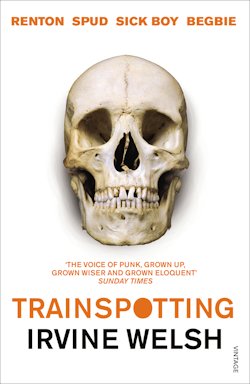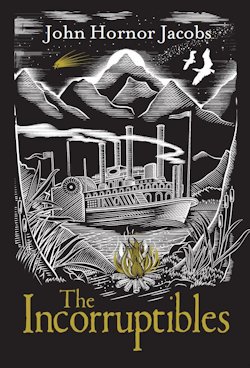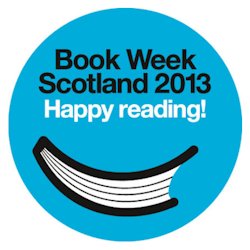Welcome back to the British Genre Fiction Focus, Tor.com’s regular round-up of book news from the United Kingdom’s thriving speculative fiction industry.
This week, the results of a celebratory survey about the best Scottish books are in, and does speculative fiction figure in to the top ten? You’re damn right it does! On the other hand, only one woman made the grade, and I can’t help but wonder what the (predictable) winner says about the contemporary perception of my people.
Stay tuned, too, for news of two exciting new books: The Bone Clocks by Cloud Atlas author David Mitchell is coming from Sceptre in September, and somewhat sooner, in June, a hardscrabble adult fantasy debut by a Bram Stoker Award nominated author.
The Best Scottish Novels
With potential independence on the horizon, in case you weren’t aware — and looking likelier by the day, I doth declare — many Scots have had cause in recent months to wonder what it means to be Scottish.
The British Genre Fiction Focus certainly isn’t the place for me to get into the definition of our national identity, however it is appropriate to consider this question in view of the release last week of the results of a poll about the best Scottish books.
Conducted by the Scottish Book Trust to tie in with Book Week Scotland — a celebration of the country’s literary heritage which ended in early December — the poll received nearly 9,000 nominations before closing. These were drawn from a lengthy list of the 50 best Scottish books of the last 50 years which Stuart Kelly put together for The Scotsman in late October.
To his credit, Kelly’s list included quite a bit of speculative fiction, not least Under the Skin by Michel Faber, Life After Life by Kate Atkinson, Glister by John Burnside and Newton’s Wake by Ken MacLeod. Sadly none of these novels made the top ten, which was released last week:
- Trainspotting by Irvine Welsh (Vintage) – 833 votes
- Lanark by Alasdair Gray (Canongate Canons) – 750 votes
- Black and Blue by Ian Rankin (Orion) – 591 votes
- The Bridge by Iain Banks (Abacus) – 496 votes
- One Fine Day in the Middle of the Night by Christopher Brookmyre (Abacus) – 416 votes
- Excession by Iain M Banks (Orbit) – 330 votes
- Morvern Callar by Alan Warner (Vintage) – 296 votes
- 44 Scotland Street by Alexander McCall Smith (Abacus) – 282 votes
- The Trick is to Keep Breathing by Janice Galloway (Vintage) – 271 votes
- Docherty by William McIlvanney (Canongate Books) – 269 votes
As you can see, there’s some good news for those of us who were rooting for genre fiction to get a look-in: both of Banks’ books feature speculative elements — Excession especially — as does Alasdair Gray’s distinguished debut. Result!

That said, I can’t help but wonder what it says about Scots that Trainspotting by Irvine Welsh has been named the best Scottish book. Nor can Welsh himself, albeit for different reasons:
“I don’t know if Trainspotting is the best Scottish book — I’m far from convinced it’s my own best book. But I’m obviously flattered just to be on that list of great novels with those amazing writers, especially when I consider some of the brilliant books and my personal favourites that never made it onto this list.”
Kelly has his regrets as well. Well, he has one, but it’s big ‘un:
“Crime, comedy, science fiction, the avant-garde — the public vote has reinforced the diversity of contemporary Scottish writing. My sole regret is that we have only one woman on the list — that said, The Trick is to Keep Breathing [by Janice Galloway] is indubitably a contemporary classic.”
As is Trumpet by Jackie Kay, but hey: this one’s on the world.
And the world is the word, because before we move on, we need to note that the poll received votes from “57 different countries including the USA, Ethiopia, Iceland and South Korea.” So perhaps the problem here — if indeed there is a problem, and that’s debatable; though it portrays Scottish people poorly, Trainspotting is terrific — is not how we see ourselves, but how the world sees us.
Let me offer you a penny for your thoughts on Scots. You don’t think we’re all like Renton, right?
Cover Art Corner: Cometh The Incorruptibles
One of the many authors who parted ways with Night Shade Books back when the controversial small press went belly up, John Hornor Jacobs — Bram Stoker Award nominated for his phenomenal first novel, Southern Gods — is due to makes his adult fantasy debut in the UK by way of The Incorruptibles, the first book in a series of three.

Recently, Gollancz revealed the stark cover art by Edward Bettison, and it looks lovely, doesn’t it?
Now imagine it with gold foil. A keeper, clearly.
Here’s a bit about the book:
In the contested and unexplored territories at the edge of the Empire, a boat is making its laborious way upstream. Riding along the banks are the mercenaries hired to protect it — from raiders, bandits and, most of all, the stretchers, elf-like natives who kill any intruders into their territory. The mercenaries know this is dangerous, deadly work. But it is what they do.
In the boat the drunk governor of the territories and his sons and daughters make merry. They believe that their status makes them untouchable. They are wrong. And with them is a mysterious, beautiful young woman, who is the key to peace between warring nations and survival for the Empire. When a callow mercenary saves the life of the Governor on an ill-fated hunting party, the two groups are thrown together.
For Fisk and Shoe — two tough, honourable mercenaries surrounded by corruption, who know they can always and only rely on each other — their young companion appears to be playing with fire. The nobles have the power, and crossing them is always risky. And although love is a wonderful thing, sometimes the best decision is to walk away. Because no matter how untouchable or deadly you may be, the stretchers have other plans.
Gollancz plans to publish The Incorruptibles in June 2014, a book which, according to Myke Cole, “gives us the very thing we read fantasy for: something new. The Incorruptibles shakes like a rattlesnake, sings like a bullet, whispers like a tumbleweed dancing over hardscrabble. Fantasy needs writers who push the envelope, and Jacobs finds the edge and tears right through it.”
Tear away!
Behold The Bone Clocks
Keen as I am to read The Incorruptibles, and pleased as I was to see speculative fiction figure in to the aforementioned top ten, the most rousing announcement in recent weeks for me was news of a new book by that estimable Englishman David Mitchell.
The Bone Clocks marks Mitchell’s first novel proper since The Thousand Autumns of Jacob de Zoet in 2010, though earlier this year he and his wife Keiko Yoshida translated The Reason I Jump: One Boy’s Voice from the Silence of Autism by Naoki Higashida together.
Per this piece published by The Bookseller:
The “rich and strange” novel will follow the story of Holly Sykes, who runs away from home in 1984 and 60 years later can be found in the far west of Ireland, raising a granddaughter as the world’s climate collapses. […] In between, Holly is encountered as a barmaid in a Swiss resort by an undergraduate sociopath in 1991; has a child with a foreign correspondent covering the Iraq War in 2003; and, widowed, becomes the confidante of a self-obsessed author of fading powers and reputation during the present decade.”
Holly’s life is repeatedly intersected by a slow-motion war between a cult of predatory soul-decanters and a band of vigilantes. According to Sceptre: “Holly begins as an unwitting pawn in this war — but may prove to be its decisive weapon.”
The publisher said: “The arc of a life, a social seismograph, a fantasy of shadows and an inquiry into aging, mortality and survival, The Bone Clocks could only have been written by David Mitchell.”
In case it wasn’t completely clear, Mitchell’s new novel will indeed feature several speculative elements, similar, I’d say, to those that made Cloud Atlas such a classic. According to an interview with The Spectator conducted nearly a year ago, when the author was busy composing The Bone Clocks:
It has “dollops of the fantastic in it,” though not of the hobbits-and-elves kind. “Stuff between life and death. And the soul.” The fantasy material is “volatile,” [Mitchell] says. “It’s great as long as it’s off screen but the moment you show it or explain it then you can hear the hiss of deflating air.”
The Bone Clocks will be published by Sceptre next September. The long wait for that promised day begins today…
Niall Alexander is an extra-curricular English teacher who reads and writes about all things weird and wonderful for The Speculative Scotsman, Strange Horizons, and Tor.com. He’s been known to tweet, twoo.










